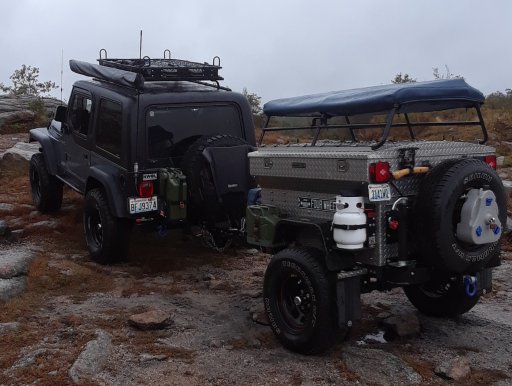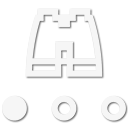Ok... we're getting close to the ten-day countdown. We (Greg Eigsti, Oli Hellevic, and myself [Paul Dickinson]) had a teleconference call this evening, and tightened things up and filled in the blanks. Please read the next few posts for further clarification on what to bring, what not to bring, vehicle requirements, and when & where we're meeting up initially. Please continue to follow this thread for further updates and such as we get closer to the departure date/time.
Here we go.
Vehicle Requirements:
Vehicles should be in good working order. We will be driving about 600 miles total over six days essentially off-pavement. That means cooling system is working well and not leaking, hoses are good, ignition is running strong, good secured battery & wiring, fluids are relatively fresh, brakes are in good working condition, U-Joints are good, etc.; and any known issues have been fixed before the meet-up day. This should be for any Overlanding trip you're planning on participating with, not just this one.
Tires should have good tread on them, and be in good safe condition - preferably not street tires but AT or MT tires.
All vehicles must have a full size, mounted matching spare tire with good tread on a proper rim (no temporary spares even if they are of a matching size). Plug kits are great (I've got one), but they only go so far.
Vehicles must have strong tow-points (like tow hooks) front & rear (a 2" receiver also counts as a tow-point). Those bent wire-looking things welded under some vehicles used to tie them down from the factory for transport aren't really tow-points. Even the best set-up overland vehicle sometimes needs a little tug to get over/through an obstacle - there's no shame in needing a tug sometimes. Using a trailer hitch tow ball as a tow-strap attachment point is dangerous - preferred is a D-ring attached to a 2" receiver bracket. Something that looks like this:
This Warn Industries D-Ring Mount has a 3/4 inch pin and is sold individually.
www.warn.com
Each vehicle should have a tow strap or recovery strap (not a chain) of some kind strong enough for the weight of their vehicles. Straps must have loops at the ends, not metal hooks (metal hooks are dangerous).
Must have a jack capable of lifting your vehicle to change a tire (does not have to be a high-lift jack).
Need to have a spare fan belt(s) for your engine. We can repair a busted radiator hose on the trail; we can't tape together a busted fan belt. They're cheap; pick one up at any parts store.
Need a GMRS radio (and a license to go with it). I'll have a spare hand-held or two if you don't have one.
Vehicle must be capable of traveling
at least 150 miles using the gasoline you're carrying. Figure we'll be driving relatively slow and not on pavement; you will not be getting anywhere near your normal highway MPG. Plan accordingly - Jerry cans are your friend. When we stop for gas,
everyone fills-up
or tops-off (sometimes we might have to take a long detour, a gas station we thought would be open might be closed, etc.)
.
The trails in the PNW are tight with brush in places. Plan on possible trail pinstriping on your vehicle or trailer.
If you're planning on bringing a trailer, think small(er). WWII military-type trailer sized, or fairly small teardrop-type or expedition trailers are your best bet. Either way, trailers need to have good rugged suspension and off-road tires ("LT" series tires at least) with good tread, and high clearance underneath. AND... all trailers should have a spare tire.
If your trailer is running the same size wheel & tire and bolt-pattern as your tow vehicle's full-size matching spare tire, that's fine. But if not, the trailer should its own dedicated matching mounted spare wheel and tire. FWIW, my lil' trailer has its own spare as it doesn't match any of my other vehicle's tires.
I am a nurse. If you have a serious medical condition (like something that requires rescue medications, you carry an epi pen, you have seizures, etc.) please let me know at the meet & greet at 0830 Monday morning. If you're traveling by yourself on this trip and have medical issues, it would be helpful if you had a condensed medical record/history with you, & a list of meds and contact info. Again; tell me at the 0830 meeting (before the 0900 departure) and tell me where you're keeping the info in your vehicle. It does me or anyone else no good if it is all stored in your phone - print it out and put it in your vehicle (and let me know where in your vehicle it is placed).








